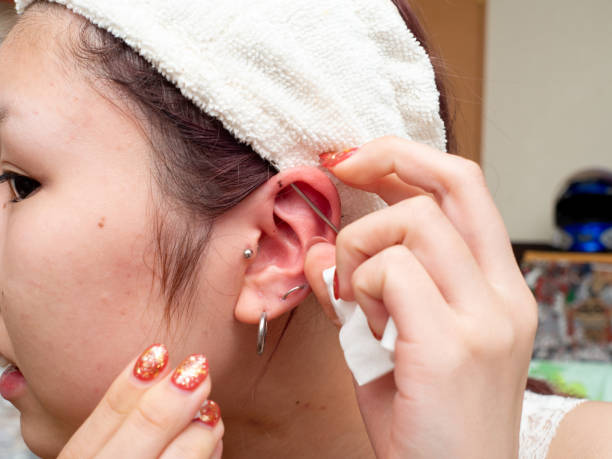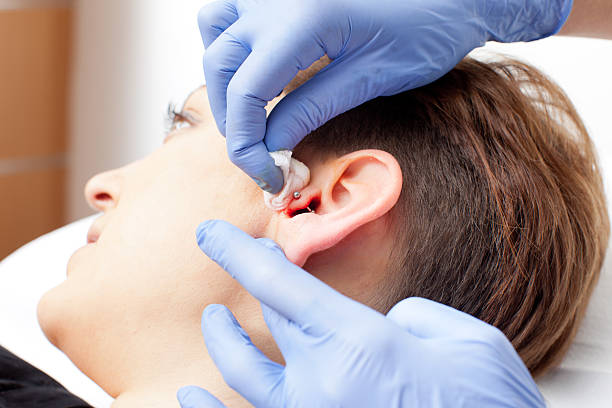Ear Piercing Aftercare - How to Treat Your Pierced Ear
Ear piercing is one of the most common forms of body modification. It is a quick and simple procedure that involves making a small hole in the earlobe or cartilage to insert a piece of jewelry.
While getting a piercing is a relatively easy process, the aftercare is just as important as the piercing itself. Proper aftercare can help prevent infections, reduce healing time, and ensure your new piercing stays healthy and looks great.
How to Clean Your Piercing
The most important thing you can do to care for your piercing is to keep it clean. The following are steps to properly clean your piercing to prevent infection and other complications.
Wash Your Hands
Before touching your piercing, make sure your hands are clean.
Clean the Piercing
Use a saline solution or mild soap and warm water to clean the piercing. Be gentle and avoid twisting or rotating the jewelry. Use a cotton swab or a clean cloth to clean the piercing, making sure to remove any crust or debris.
Rinse
Rinse the piercing thoroughly with warm water to remove any soap residue.
Dry
Gently pat the area dry with a clean paper towel or cloth. Avoid using a towel that may leave fibers behind.
Apply Antiseptic
You can also apply an antiseptic to the piercing to help prevent infection. However, it's important to use an antiseptic specifically designed for piercings and follow the instructions carefully.
Avoid Irritants
Avoid using harsh chemicals or lotions on or around the piercing area.
Consistency
It's essential to clean your piercing at least twice a day, especially during the first few weeks after getting it done. Keeping your piercing clean will help prevent infection and reduce healing time.
Preventing Infection
While cleaning your piercing is the most important step in preventing infection, there are other things you can do to help keep your piercing healthy.
Avoid Touching Your Piercing
Resist the urge to touch or play with your new piercing, which can introduce bacteria and irritate the area.
Avoid Swimming
Avoid swimming, especially in public pools or bodies of water like lakes or oceans, as these can harbor bacteria that can cause infection.
Avoid Cotton Swabs and Other Fabric Materials
Don't use cotton swabs and other fabrics to clean under your piercings. Fibers can get caught in the clasps or your tender areas, leading to infection.
Wear Loose Clothing
Wear loose clothing around your piercing to prevent any friction or rubbing that can irritate the area.
Avoid Sleeping on the Piercing
Avoid sleeping on the side with the piercing, as this can put pressure on the area and slow the healing process.
Don't Remove the Jewelry
Avoid removing the jewelry too early, as this can cause the piercing to close up and increase the risk of infection.

Signs of Problems with Your New Piercing
While proper aftercare can help prevent infection and reduce the risk of complications, there are some problems you should look out for:
Infection
Signs of infection include redness, swelling, discharge, and pain. If you notice any of these symptoms, seek medical attention immediately.
Keloids
Keloids are raised scars that form around the piercing. They can be treated with over-the-counter creams or, in severe cases, with medical procedures.
Hypertrophic Scars
Hypertrophic scars are similar to keloids but do not extend beyond the boundaries of the piercing. They can also be treated with over-the-counter creams or medical procedures.
Rejection
Sometimes the body may reject the jewelry, causing the piercing to migrate or move out of place. If you notice your piercing is moving or feels loose, contact your piercer immediately.
Healing Time
The healing time for a piercing varies depending on the location of the piercing and individual factors like how attentive your aftercare treatment is, exposure to sun and water, etc. We've included some information for key areas of ear piercings here.
Earlobe Piercing
Earlobe piercings are the most common type of piercing, and they tend to heal relatively quickly. On average, it takes about six to eight weeks for an earlobe piercing to heal fully. It's important to continue cleaning the piercing for at least a few weeks after it appears to have healed to ensure it is fully healed and not at risk of infection.
Cartilage Piercing
Cartilage piercings are a bit more complicated than earlobe piercings because they take longer to heal and can be more prone to infection and other issues. It can take anywhere from six months to a year for cartilage piercings to heal fully. During this time, it's important to continue cleaning the piercing and avoid touching or playing with the jewelry. Cartilage piercings can be more susceptible to infections, so it's crucial to take extra care during the healing process.
What to Expect During the Healing Process
The healing process for a piercing can be uncomfortable and, at times, painful. During the first few days after getting a piercing, you may experience some swelling, redness, and soreness. You may also notice some discharge or crusting around the piercing. These symptoms are normal and usually go away within a few days.
As the piercing starts to heal, you may notice some itching and tenderness around the piercing. This is a sign that the piercing is healing. Resist the urge to scratch or play with the piercing and surrounding area. It's also normal to experience some intermittent discomfort or soreness during healing.
It's important to remember that everyone's body is different, and healing times can vary. If you're concerned about your piercing or have any questions, don't hesitate to contact your piercer or a medical professional.
The healing time for a piercing can vary depending on the location of the piercing and individual factors such as your immune system and overall health. It's essential to continue cleaning the piercing and taking care of it during the healing process to ensure that it heals properly and doesn't become infected. With patience and proper care, your piercing will heal completely without any issues.
Shop Ear Piercings at Body Pierce Jewelry
Shop our selection of high-quality ear piercing jewelry options to find your perfect fit today!



